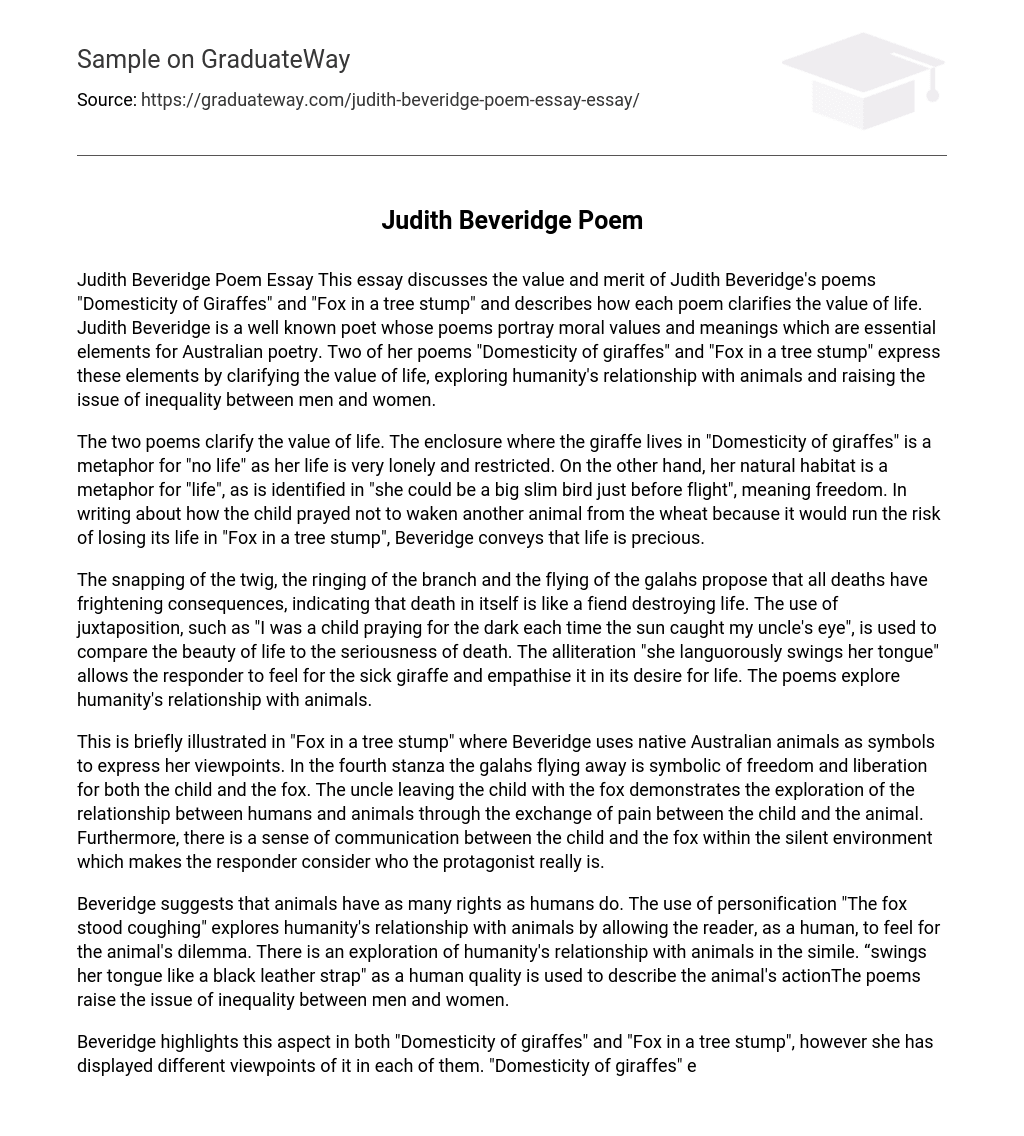Judith Beveridge Poem Essay This essay discusses the value and merit of Judith Beveridge’s poems “Domesticity of Giraffes” and “Fox in a tree stump” and describes how each poem clarifies the value of life. Judith Beveridge is a well known poet whose poems portray moral values and meanings which are essential elements for Australian poetry. Two of her poems “Domesticity of giraffes” and “Fox in a tree stump” express these elements by clarifying the value of life, exploring humanity’s relationship with animals and raising the issue of inequality between men and women.
The two poems clarify the value of life. The enclosure where the giraffe lives in “Domesticity of giraffes” is a metaphor for “no life” as her life is very lonely and restricted. On the other hand, her natural habitat is a metaphor for “life”, as is identified in “she could be a big slim bird just before flight”, meaning freedom. In writing about how the child prayed not to waken another animal from the wheat because it would run the risk of losing its life in “Fox in a tree stump”, Beveridge conveys that life is precious.
The snapping of the twig, the ringing of the branch and the flying of the galahs propose that all deaths have frightening consequences, indicating that death in itself is like a fiend destroying life. The use of juxtaposition, such as “I was a child praying for the dark each time the sun caught my uncle’s eye”, is used to compare the beauty of life to the seriousness of death. The alliteration “she languorously swings her tongue” allows the responder to feel for the sick giraffe and empathise it in its desire for life. The poems explore humanity’s relationship with animals.
This is briefly illustrated in “Fox in a tree stump” where Beveridge uses native Australian animals as symbols to express her viewpoints. In the fourth stanza the galahs flying away is symbolic of freedom and liberation for both the child and the fox. The uncle leaving the child with the fox demonstrates the exploration of the relationship between humans and animals through the exchange of pain between the child and the animal. Furthermore, there is a sense of communication between the child and the fox within the silent environment which makes the responder consider who the protagonist really is.
Beveridge suggests that animals have as many rights as humans do. The use of personification “The fox stood coughing” explores humanity’s relationship with animals by allowing the reader, as a human, to feel for the animal’s dilemma. There is an exploration of humanity’s relationship with animals in the simile. “swings her tongue like a black leather strap” as a human quality is used to describe the animal’s actionThe poems raise the issue of inequality between men and women.
Beveridge highlights this aspect in both “Domesticity of giraffes” and “Fox in a tree stump”, however she has displayed different viewpoints of it in each of them. “Domesticity of giraffes” explains the perception that the male is the provider by the bull drenching the ground to provide the giraffe some moisture. Both poems’ communication with the audience and raises the issue of inequality between men and women because the messages are read on what comes across as a feminist’s point of view, which in turn would more likely affect a female audience than a male audience.
The oxymoron “sensual agony” shows the giraffes . The assonance “I knew my uncle’s rabbit-skinning hands” describes the masculine qualities of the uncle. Both of Beveridge’s poems are effective because they clarify the value of life, explores humanity’s relationship with animals through symbolism and they raise the issue of inequality between men and women through analogies. These poems are ultimately a poem which questions and challenges society’s moral meanings and values.





